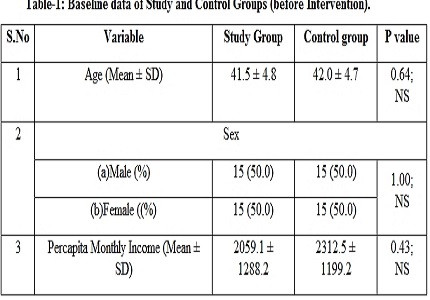An interventional study with health education to modify the risk factors for the control of blood pressure among the newly diagnosed adult hypertensives, Andhra Pradesh
Abstract
Background: India is developing rapidly, which is evidenced by its developmental indicators. The country is in transitional period between developing and developed nations. With the effect of globalization, the lifestyleof the people also changed rapidly from traditional way of living to western style of living, which is contributing to rapid changes in disease patterns. The incidence and prevalence of Non-communicable diseases is increasing when compared with communicable diseases, which are associated with changes in the life style. The prevalence of hypertension and its risk factors are increasing in India. The present study was done among the newly diagnosed adult hypertensive subjects to find out whether health educationfor modification in the diet and lifestyle factors will have any effect in the control of hypertension.
Objective: To study the effect of health education intervention ondiet, lifestyle factors and thereby decrease in blood pressure levels among newly diagnosed adult hypertensive subjects.
Methodology: A total of 60 newly diagnosed adult hypertensive subjects were selected randomly from a recent study done among the adults of both sex living in urban slum areas of Tirupati, Andhra Pradesh for this interventional study. Out of these, 30 subjects each were randomly allocated to the study and control groups. Results- In the study group, after health education intervention the proportion of hypertension decreased from 100% to 60% while in the controls, where health education was not given, it decreased from 100% to 90% only.
Conclusion: There has been significant difference in the reduction of hypertension in the study group compared to control group. There has been reduction in all the risk factors studied after the intervention compared to the pre-intervention levels in the study group but however the differences were statistically significant with regard to extra salt intake, saturated fat intake and adequate fiber intake.
Downloads
References
2. Vorster HH. The emergence of cardiovascular disease during urbanisation of Africans. Public Health Nutr. 2002 Feb;5(1A):239-43. [PubMed]
3. Khor GL. Cardiovascular epidemiology in the Asia-Pacific region. Asia Pac J ClinNutr. 2001;10(2):76-80. [PubMed]
4. GodleyP, Pham H, RohackJ, WoodwardB, YokoyamaK, MaueSK.Opportunities for improving the quality of hypertension care in a managedcaresetting.AmJ HealthSystPharm2001;58(18):1728-1733.
5. U. S. Department of Health and Human Services. The Seventh Report of the Joint National Committee on Prevention, Detection, Evaluation and Treatment of High Blood Pressure. NIH Publication 2004 No. 04-5230:11-12.
6. Canadian Hypertension Education Program, CHEP Recommendations for the Management of Hypertension; 2009:1-39.
7. Agarwal AK. Social Classification: The need to update in the present scenario. Indian J Community Med 2008; 33(1): 50-51.doi:10.4103/0970-0218.39245.
8. Available from: http://eaindustry.nic.in/asp2/listd.asp (Cited on Sep 2010).
9. Saptharishi LG, Soudarssanane MB, Thiruselvakumar D, Navasakshi D, Mathanraj S, Karthigeyan M, Sahai A, et al. Community based Randomized Controlled Trial of non pharmacological interventions in prevention and control of hypertension among young adults. Indian J Community Med 2009; 34(4): 329-34.doi: 10.4103/0970-0218.58393.
10. HemaSubramaniyan, BalaSoudarssanane M, Jayalakshmy R, Thiruselvakumar D, Navasakshi D, Ajith Sabai, Saptharishi LG. Non pharmacological interventions in hypertension: A Community based Cross over Randomized Control Trial. Indian J Community Med 2011; 36(3): 191-96.doi: 10.4103/0970-0218.86519.
11. Hemanth Mahajan, Yasmeen Kazi, Bhuvan Sharma, Velhal GD. Health education: An effective intervention in hypertensive patients. International Journal of Recent Trends in Science and Technology 2012; 4(2):77-82.
12. SubithaLakshminarayanan, Soudarssanane M, Bala, Murugesan Ramanujan, Kannan G. Effectiveness of physical activity promotion in blood pressure and blood sugar reduction: A Community based intervention study in rural South India. J Family Community Med 2012; 19(2): 81-7.doi: 10.4103/2230-8229.98284.
13. Rajeev Gupta, Soneil Gupta. Strategies for initial management of hypertension. Indian J Med Res 2010; 132(5): 531-42.
14. Fagard RH. Effects of exercise, diet and their combination on blood pressure. J Hum Hypertens 2005; 19(3): 20-24.doi:10.1038/sj.jhh.1001956. [PubMed]
15. Geleijnse JM, Grobbe DE, Kok FJ. Impact of dietary and life style factors on the prevalence of hypertension in western populations. Journal of human hypertension 2005; 19: S1-4.
16. Campbell NR, Burgesse E, Choi BC, Taylor G, Wilson E, Cleroux J, Fodor JG, Leiter LA, Spence D. Life style modifications to prevent and control hypertension. CMAJ 1999;160(9):7-12.
17. Jeffery Cutter, Bee Yian Tan, Suok Kai Chew. Levels of cardiovascular disease risk factors in Singapore following a national intervention programme.Bulletin of the World Health Organization 2001; 79(10): 908-15.
18. Shah Ebrahim, George Davey Smith. Lowering blood pressure: a systematic review of sustained effects of non pharmacological interventions. J Public Health Med 1998; 20(4): 441-48. [PubMed]
19. Lawrence J Appel, Michael W Brands, Stephen R Daniels, Njeri Karanja, Patricia J Elmer, Frank M sacks, et al. Dietary Approaches to prevent and treat hypertension: A Scientific statement from the American Heart Association. Available from: http://hyper.ahajournals.org/at VAMED CTR BOISE 2012: 296-308.
20. Jennifer Lochner, Bruin Rugge, Dolores Judkins. How effective are life style changes for controlling hypertension? J Fam Pract. 2006;55(1):73-74.
21. Aram V Chobanian, Martha Hill. National Heart, Lung and Blood Institute workshop on sodium and blood pressure. A critical review of current scientific evidence. Available from: http://hyper.ahajournals.org.Hypertension 2000;35(4): 858-63.
22. Randy Wexler, Glen Aukerman. Non pharmacologic strategies for managing hypertension. American Academy of Family Physicians 2006; 73(11): 1953-56.

Copyright (c) 2018 Author (s). Published by Siddharth Health Research and Social Welfare Society

This work is licensed under a Creative Commons Attribution 4.0 International License.


 OAI - Open Archives Initiative
OAI - Open Archives Initiative


